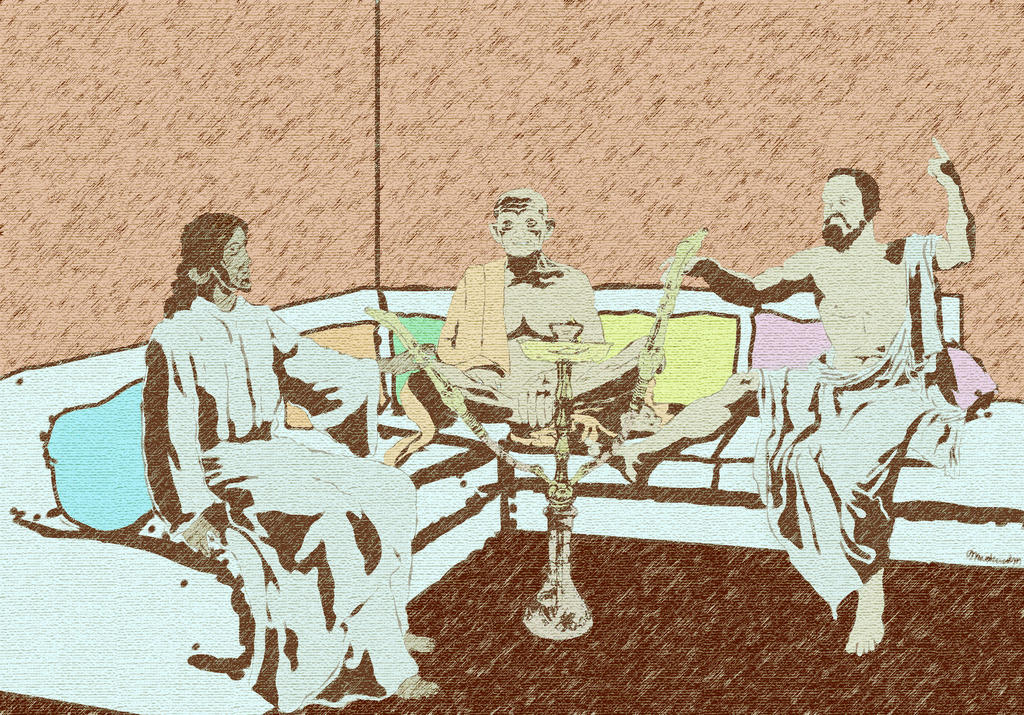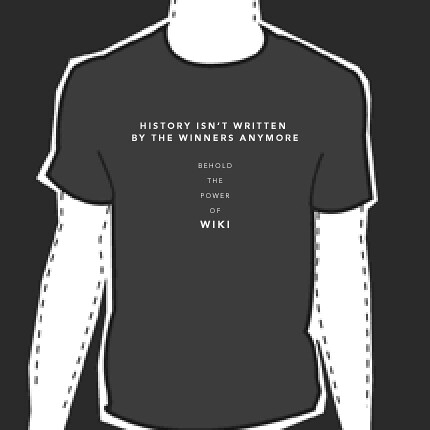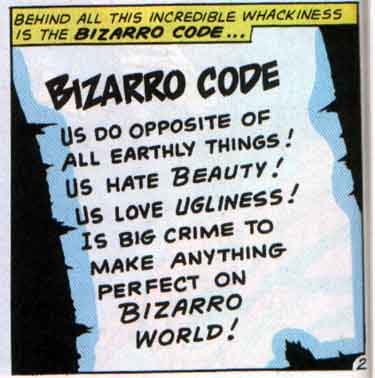This is Part 2 of an article series. You can find Part 1 here: http://11thcompany.blogspot.com/2012/12/read-as-wrong-origins-of-bizzaro-40k.html
Introduction and
Recap:
To recap, in part 1 of this series, I closed by stating that
this article series intends to move forward with the notion that there is a BETTER
way to negotiate rules disputes other than “Read as Written”, that “Read as
Written” (RaW) as a sole rules arbitration tool produces the same “Bizzaro 40K’
that gets produced when rules arbitration takes place without applying the RaW philosophy. Moreover, part 1 also sought to introduce the
idea that the RaW banner has become a sort of cult-like mentality which I refer
to as the “Church of RaW”, to which many people within our community flock to
and follow. Mostly, this is because the
promises of the Church are quite alluring as it promises a method of rules
arbitration which is logical, results in absolute truths, and disregards our
human nature’s incessant ability to interject our personal feelings into
arguments. However, the siren’s call
that is these idealistic principles has some very serious drawbacks of which I
believe our community is growing to ignore.
Ultimately, where I will end up with these essays is not as
a denial as to the usefulness of the philosophy of RaW. Rather, what I am seeking to do is to help
provide the community with the thoughts that perhaps RaW is not the ONLY answer but rather a TOOL that when
combined with all the other myriad tools out there, HELPS to CORRECTLY resolve
rules disputes. I will contend
that using RaW as anything other than one tool out of a tool box ultimately
leads to INCORRECT rules resolutions, the same INCORRECT rules resolutions
that a follower of the Church accuses anyone who is not a member of the Church
of arriving at by any other methodology.
What is Correct?
If I really wanted to, I could devolve this essay at this
point into a riotous romp through thousands of years of philosophy about “the
Universe”, “Universal Truth”, “human perspective”, and close out with a ton of
links to thousands of philosophical essays covering this topic. We could all sit around, toke on a hookah,
talk about our small part in such a massive Universe, and ultimately resolve
nothing except getting high while stroking our egos. (Hell, we could get really interesting, hit
some acid, and end the night actually thinking we’ve solved the Universe’s
greatest mysteries by tapping into the stream of unconscious energy and reading
each other’s minds. Seen this happen, so
true story, bro. :) )
Fortunately, though, I don’t have to go there! Our beloved gaming system has definable
boundaries and actual answers to the mysteries that it manufactures, and even
better, solely because our game system is manufactured, that means our brains
can actually wrap themselves around the concepts it presents. Sweet!
So, if we actually do have correct answers, then why are
there so many rules arguments? Where are
these correct answers when I’m sitting at a game table trying to explain to
some very emotional competitor that actually, a Flying Monstrous Creature not
being grounded after it takes a grounded test is wrong even though the Rulebook
doesn’t explicitly state that, is neither “Read as Written” nor correct. (See what I did there? Used a RaW argument that was proven WRONG! Note the Bizzaro 40K that this rules issue
created.)
One of the major tenets of the RaW philosophy is that if you
read the words of the rules exactly as they are written that you will arrive at
the only possible, logical conclusion. If
this were not true then the Church of RaW would be forced to acquiesce that
perhaps correct answers to rules questions can be found by some other means
than just reading words.
Although I agree that this line of thinking is very
alluring, there’s this BIG problem that we know for an undeniable FACT that RaW
doesn’t always produce correct
answers. What encompassing proof by
contradiction is this that is so absolutely powerful?
The GW FAQs.
See, correct
answers in the 40K Universe don’t come from logical proofs. They don’t derive themselves out of undeniable,
mathematical certainty. They come from
the gaming company that wrote the game.
GW is the supreme court of our game.
What they say is the correct answer regardless of if what they say is
logically ascertainable from the Rulebook or not.
This is what CORRECT is.
Ultimately, as a TO and podcaster, when I get asked a rules
question, I’m not interested in providing WRONG answers. I’m interested in providing RIGHT
answers. RIGHT answers are those that
when the rubber meets the road that the gaming company will agree with me on.,
not those that I can obscure in a drawn out proof misquoting or cherry picking
sentences and words.
This is very important because it introduces the notion that
what we should be seeking is to actually find those CORRECT answers, not
logical proofs of INCORRECT ones. And
this leads to our next topic.
Reading Comprehension
One thing that is immediately obvious about our set of CORRECT answers is that our
governing body doesn’t always rule in favor of the direction that the “Read as
Written” results in. Fundamentally, this
should be all you need at this point to out of hand reject RaW as a rules
governing philosophy, and I could end this essay where it stands. However, as stated, that’s not my goal nor
intent. What I want to express is
that RaW is IMPORTANT but only because RaW is the first baby steps into a much
broader area, known as Reading Comprehension.
I LOL’ed when I read this:
(WIKIPedia on reading Comprehension)
“Reading comprehension is defined as the level of understanding of a text/message. This understanding comes from the interaction between the words that are written and how they trigger knowledge outside the text/message. .[1]”Woah! “the interaction between the words that are written and how they trigger knowledge outside the text/message?” Hold the phone! Are you trying to tell me that there is meaning to some text besides what is actually written on the paper? That true comprehension of what you read doesn’t just involve the words on the paper but also knowledge outside the paper?
“That Which Isn’t
Written.”
I recall a time in my life where I HATED analogies. I could write an essay on that topic. You know, those statements on the SAT that
read something like: “this is to this as that is to _______”. And you were expected to come up with an
answer to this. Absurd! Preposterous!
You can’t prove a result to this bogus question. There’s nothing factual here. There is nothing but assumptions based on
what you “feel like” the common ground it.
I loved history when I was in school in no small part to my
Dad being a history teacher. I
specifically remember a teacher I had junior year who would use standardized
tests at the end of each chapter in our book.
I was a smart-ass teenager like everyone else, and I remember several
times, thinking I was funny and not realizing that I was just being a jack-ass
(see statement about nerd culture above), that I would go up to her in the
middle of tests and express to her that although I knew the answer to Question
#36 was “A”, that arguably “C” could potentially be correct as the question
itself was ambiguous due to wording.
And even then, I couldn’t admit it to myself that if it was
so ambiguous, provably so, why did I know for certain that “A” was the correct
answer even though by logical proof it wasn’t?
Because there are forces at work which drive CORRECT answers
which aren’t necessarily WRITTEN DOWN in the text you are reading. “That which isn’t written” is exactly what
English professors are trying to beat into your skull with all that jazz about
context, bias, history, and a load of other jargon that I of course memorized
(math geeks have zero trouble memorizing and regurgitating) but not actually
internalized (because it’s tripe and unprovable to begin with.
Wouldn’t you know? Just because you can argue ambiguity in
an analogy doesn’t mean that the analogy has no CORRECT answer? All that means is that you flatly just don’t
perceive the answer. It’s not ambiguous
at all if the guy that scored an 800 on the English portion of the SAT blew through
it. You just suck at reading
comprehension (and probably at vocabulary which is a big contributor, but I
digress).
Think about it. The
lauded authors of history didn’t get that way because “they wrote good words”. You don’t MOVE people emotionally with
text. You move them when they comprehend
what you are really trying to say.
And what I’m really trying to say is that it is
fundamentally obvious with any amount of reading comprehension that our governing
body, the body which produces the CORRECT answers, doesn’t just use words to
find them, it uses comprehension of the text to produce them.
“That which isn’t written” NOT EQUAL TO “Read as Written”.
More to come.














